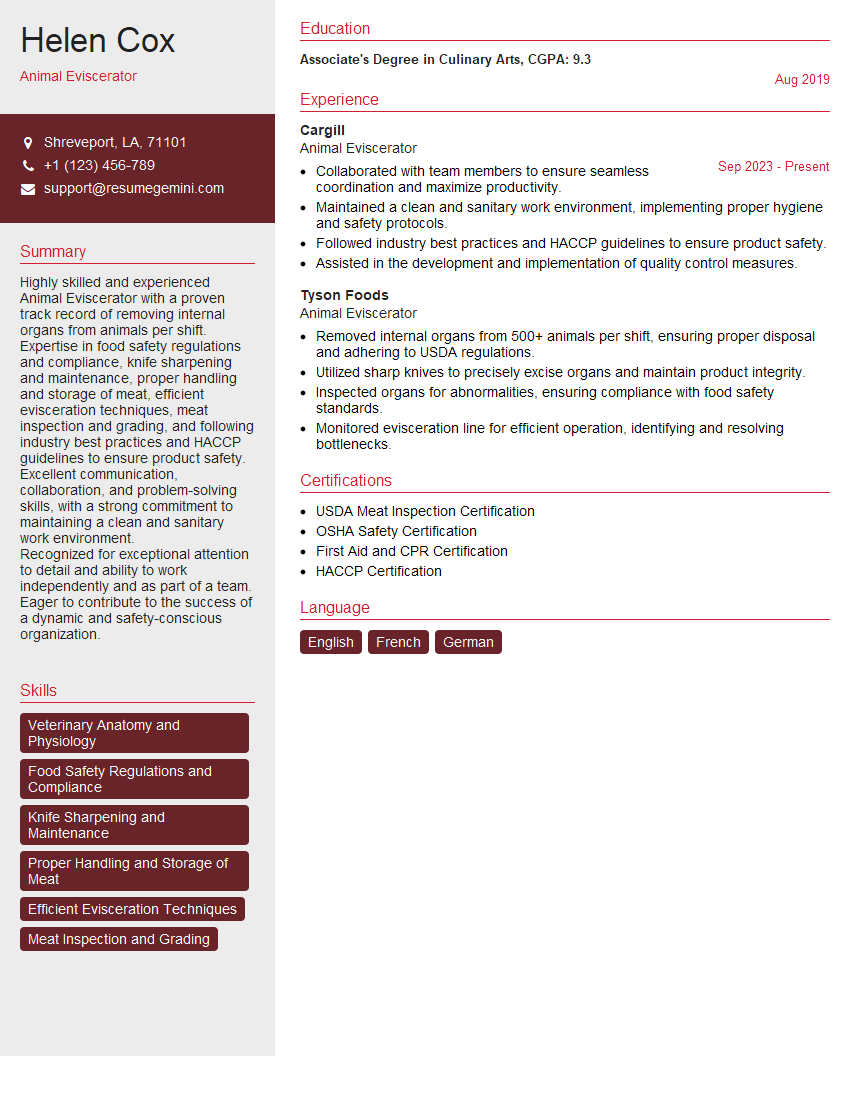Are you a seasoned Animal Eviscerator seeking a new career path? Discover our professionally built Animal Eviscerator Resume Template. This time-saving tool provides a solid foundation for your job search. Simply click “Edit Resume” to customize it with your unique experiences and achievements. Customize fonts and colors to match your personal style and increase your chances of landing your dream job. Explore more Resume Templates for additional options.

Helen Cox
Animal Eviscerator
Summary
Highly skilled and experienced Animal Eviscerator with a proven track record of removing internal organs from animals per shift. Expertise in food safety regulations and compliance, knife sharpening and maintenance, proper handling and storage of meat, efficient evisceration techniques, meat inspection and grading, and following industry best practices and HACCP guidelines to ensure product safety. Excellent communication, collaboration, and problem-solving skills, with a strong commitment to maintaining a clean and sanitary work environment.
Recognized for exceptional attention to detail and ability to work independently and as part of a team. Eager to contribute to the success of a dynamic and safety-conscious organization.
Education
Associate’s Degree in Culinary Arts
August 2019
Skills
- Veterinary Anatomy and Physiology
- Food Safety Regulations and Compliance
- Knife Sharpening and Maintenance
- Proper Handling and Storage of Meat
- Efficient Evisceration Techniques
- Meat Inspection and Grading
Work Experience
Animal Eviscerator
- Collaborated with team members to ensure seamless coordination and maximize productivity.
- Maintained a clean and sanitary work environment, implementing proper hygiene and safety protocols.
- Followed industry best practices and HACCP guidelines to ensure product safety.
- Assisted in the development and implementation of quality control measures.
Animal Eviscerator
- Removed internal organs from 500+ animals per shift, ensuring proper disposal and adhering to USDA regulations.
- Utilized sharp knives to precisely excise organs and maintain product integrity.
- Inspected organs for abnormalities, ensuring compliance with food safety standards.
- Monitored evisceration line for efficient operation, identifying and resolving bottlenecks.
Certificates
- USDA Meat Inspection Certification
- OSHA Safety Certification
- First Aid and CPR Certification
- HACCP Certification
Languages
- English
- French
- German
Career Expert Tips:
- Select the ideal resume template to showcase your professional experience effectively.
- Master the art of resume writing to highlight your unique qualifications and achievements.
- Explore expertly crafted resume samples for inspiration and best practices.
- Build your best resume for free this new year with ResumeGemini. Enjoy exclusive discounts on ATS optimized resume templates.
How To Write Resume For Animal Eviscerator
- Highlight your relevant skills and experience: Emphasize your proficiency in the key responsibilities of an Animal Eviscerator, including organ removal, knife handling, and food safety compliance.
- Quantify your accomplishments: Use specific numbers and metrics to demonstrate the impact of your work. For example, mention the number of animals eviscerated per shift or the percentage of organs inspected without defects.
- Showcase your teamwork and communication skills: An Animal Eviscerator often works as part of a team. Highlight your ability to collaborate effectively and communicate clearly with colleagues.
- Obtain relevant certifications: Consider obtaining certifications in food safety or meat processing to enhance your credibility and demonstrate your commitment to the industry.
- Proofread carefully: Ensure your resume is free of any grammatical errors or typos, as attention to detail is crucial in this role.
Essential Experience Highlights for a Strong Animal Eviscerator Resume
- Removed internal organs from animals per shift, ensuring proper disposal and adhering to USDA regulations.
- Utilized sharp knives to precisely excise organs and maintain product integrity.
- Inspected organs for abnormalities, ensuring compliance with food safety standards.
- Monitored evisceration line for efficient operation, identifying and resolving bottlenecks.
- Collaborated with team members to ensure seamless coordination and maximize productivity.
- Maintained a clean and sanitary work environment, implementing proper hygiene and safety protocols.
- Followed industry best practices and HACCP guidelines to ensure product safety.
Frequently Asked Questions (FAQ’s) For Animal Eviscerator
What are the primary responsibilities of an Animal Eviscerator?
An Animal Eviscerator removes internal organs from animals, ensures proper disposal, inspects organs for abnormalities, and maintains a clean and sanitary work environment.
What are the essential skills for an Animal Eviscerator?
Essential skills include proficiency in using sharp knives, knowledge of veterinary anatomy and physiology, understanding of food safety regulations, and adherence to proper hygiene and safety protocols.
What is the work environment like for an Animal Eviscerator?
Animal Eviscerators typically work in cold, wet, and physically demanding environments. They must be able to stand for long periods and perform repetitive tasks.
What is the career path for an Animal Eviscerator?
With experience and additional training, Animal Eviscerators can advance to roles such as meat inspector, quality control manager, or production supervisor.
What are the safety precautions that Animal Eviscerators must follow?
Animal Eviscerators must wear protective clothing, including gloves, aprons, and safety glasses. They must also follow proper hygiene practices to prevent contamination.
What are the challenges faced by Animal Eviscerators?
Animal Eviscerators may face challenges such as dealing with unpleasant odors, working in cold and wet conditions, and the potential for repetitive strain injuries.
What are the rewards of being an Animal Eviscerator?
Animal Eviscerators play a vital role in the food industry by ensuring the safety and quality of meat products. They can take pride in their work and the contribution they make to the food supply chain.